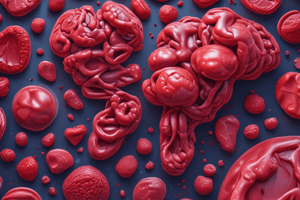Podcast
Questions and Answers
Folic acid deficiency can lead to neurological symptoms similar to Vitamin B12 deficiency.
Folic acid deficiency can lead to neurological symptoms similar to Vitamin B12 deficiency.
False (B)
What dietary sources are recommended to increase Vitamin B12 levels?
What dietary sources are recommended to increase Vitamin B12 levels?
Meat, eggs, dairy
Chronic malnutrition, alcoholism, and __________ are common causes of folic acid deficiency anemia.
Chronic malnutrition, alcoholism, and __________ are common causes of folic acid deficiency anemia.
pregnancy
Match the condition with its corresponding clinical manifestation:
Match the condition with its corresponding clinical manifestation:
Which of the following are common clinical manifestations of all anemias?
Which of the following are common clinical manifestations of all anemias?
Vitamin B12 deficiency anemia can be caused by a lack of intrinsic factor.
Vitamin B12 deficiency anemia can be caused by a lack of intrinsic factor.
What is the primary dietary component necessary for erythropoiesis?
What is the primary dietary component necessary for erythropoiesis?
Symptoms specific to Iron Deficiency Anemia include ______ and spoon-shaped nails.
Symptoms specific to Iron Deficiency Anemia include ______ and spoon-shaped nails.
Match the type of anemia with its specific symptom:
Match the type of anemia with its specific symptom:
What is a common cause of dietary deficiency leading to iron deficiency anemia?
What is a common cause of dietary deficiency leading to iron deficiency anemia?
Megaloblasts are formed as a result of impaired cell division in Vitamin B12 deficiency anemia.
Megaloblasts are formed as a result of impaired cell division in Vitamin B12 deficiency anemia.
Name one symptom specific to pernicious anemia.
Name one symptom specific to pernicious anemia.
Flashcards are hidden until you start studying
Study Notes
Anemia - Clinical Manifestations
- Common symptoms across all types of anemia: increased respiratory rate, shortness of breath with exertion, rapid heartbeat, palpitations, heart murmur, enlarged heart chambers, chest pain, bone pain, pale skin, mucous membranes, conjunctiva, and nail beds.
Nutritional Anemias
- Essential nutrients for red blood cell production: protein, iron, vitamin B12 (cobalamin), folate, vitamin C, and vitamin E.
Iron Deficiency Anemia
- Symptoms specific to Iron Deficiency Anemia: craving non-food items (pica), spoon-shaped nails, cracked lips (cheilosis).
- The body recycles most iron, excreting small amounts in feces. Iron intake is still essential.
- Causes:
- Inadequate dietary intake: vegetarian diets, insufficient protein intake.
- Reduced absorption: surgical removal of stomach, chronic diarrhea, malabsorption disorders.
- Increased requirements: pregnancy, breastfeeding.
- Blood loss: gastrointestinal bleeding, heavy menstrual bleeding.
- Chronic blood breakdown in the urine.
- Clinical Manifestations:
- Lower red blood cell count, leading to smaller red blood cells with reduced color and abnormal shape.
- Gradual onset.
- Early symptoms: headache, paleness, lethargy, fatigue, shortness of breath, sensitivity to cold.
- Late symptoms: craving non-food items (pica), inflamed tongue (glossitis), stomach irritation, cracked lips (cheilosis), smooth and sore tongue.
- Therapies:
- Increase dietary iron intake through foods and supplements.
- Oral or injected iron as needed.
Vitamin B12 Deficiency Anemia
- Symptoms specific to pernicious anemia: tingling and numbness (paresthesias), difficulty sensing body position (proprioception deficits), diarrhea, sore and red tongue.
- Symptoms specific to vitamin B12 anemia: headache, fainting, memory problems, loss of appetite, nausea, nighttime leg cramps.
- Causes:
- Insufficient intake: vegetarian diets.
- Surgery that reduces stomach size (bariatric surgery).
- Removal of parts of the stomach or small intestine.
- Decreased pancreatic secretions.
- Chronic stomach inflammation (gastritis).
- Lack of intrinsic factor (pernicious anemia) which prevents B12 absorption.
- Use of nitrous oxide for recreational purposes.
- Pernicious Anemia: the body lacks intrinsic factor, which is necessary for vitamin B12 absorption.
- Clinical Manifestations:
- Gradual onset.
- Impaired cell division and maturation of cell nuclei leading to large, immature red blood cells (megaloblasts) and misshapen red blood cells (oval, not concave) with thin membranes. These red blood cells are fragile, carry oxygen poorly, and have a shortened lifespan.
- Initial symptoms: weakness, paleness, and slight jaundice.
- Gastrointestinal symptoms: nausea, loss of appetite, darkened hands and knuckles, swollen and sore tongue.
- Neurological symptoms: decreased reflexes, memory loss, confusion, nerve damage in the extremities, gait disturbances. Neurological symptoms can progress to difficulty balancing due to spinal cord damage.
- Therapies:
- Increase dietary Vitamin B12 from meat, eggs, and dairy products.
- Oral Vitamin B12 supplements.
- Injected Vitamin B12 for malabsorption or lack of intrinsic factor.
- Interruption of treatment may lead to worsening neurological problems with permanent damage.
Folic Acid Deficiency Anemia
- Causes:
- Most common in long-term malnutrition, including people receiving intravenous nutrition (TPN), alcoholism or drug addiction, and older adults. Alcoholism poses a special risk for folic acid deficiency.
- Pregnancy.
- Periods of rapid growth in infancy and adolescence can cause temporary deficiency.
- Malabsorption disorders such as celiac disease.
- Some medications like methotrexate or chemotherapy drugs.
- Clinical Manifestations:
- Gradual onset.
- Large, immature red blood cells (megaloblasts) with fragile red blood cells.
- Paleness, progressive weakness, fatigue, shortness of breath, rapid heartbeat.
- Similar to vitamin B12 deficiency: inflamed tongue (glossitis), cracked lips (cheilosis), diarrhea.
- Differentiation from vitamin B12 Deficiency: No neurological symptoms.
- Therapies:
- Increase dietary folate intake through green leafy vegetables, fruits, cereals, and meats. Folate is absorbed in the intestines.
- Folic acid supplements for pregnant women and to prevent neural tube defects.
Studying That Suits You
Use AI to generate personalized quizzes and flashcards to suit your learning preferences.




